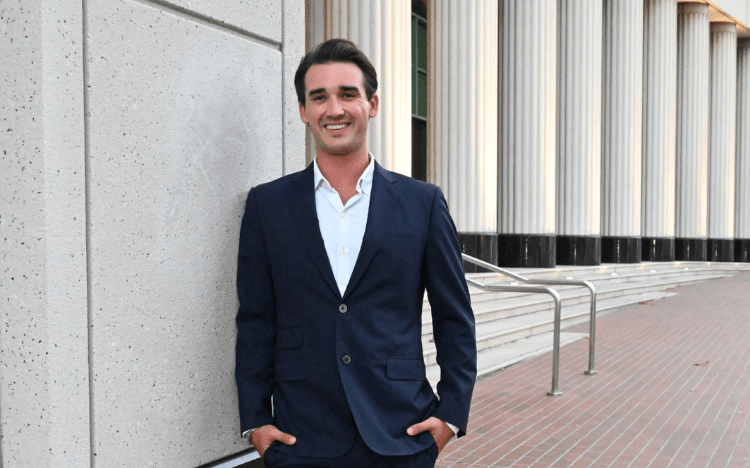While most MBA applicants apply to around five business schools, Benjamin Bush, an incoming MBA student at the University of Notre Dame Mendoza College of Business, submitted a mammoth 18 applications while searching for his best fit MBA program.
Ben wrote 38 MBA essays, submitted 36 letters of recommendation, and spent $1,900 in MBA application fees—and that’s even with seven of the 18 schools waiving the fee!
Before embarking on his MBA journey, Ben completed his bachelor’s degree in philosophy from Northern Arizona University and he’s been living in New York City since 2018. Between late 2020 and early 2021, his MBA application process took 110 days; 3.5 months to be precise.
How did he manage 18 applications at the same time? Why did he apply to so many schools? Petia Whitmore, founder of MBA admissions consulting firm My MBA Path, caught up with Ben to find out.
Ben, how and when did your MBA application journey start?
It was an evening in September 2020. All great discussions begin in the kitchen, and this one was no exception. My mother handed me a cup of hot tea and asked quietly, ‘Have you thought again about your idea to get an MBA?’ I looked back at her, slightly stunned by the suggestion. I hadn't thought about getting an MBA for quite some time.
My MBA idea in early 2019 had quickly disappeared as I spent two months flying between NY and CA watching my dear stepmother lose her battle with an aggressive cancer. Still grieving her death, I got the stunning news that my best friend had died in LA. One month later, I lost another cherished person in my life, my grandmother.
2019 ended, only to be followed by the global pandemic in 2020. So, when my mother gently reminded me of my desire to get an MBA, I was ready for the challenge.
My original thoughts to pursue an MBA had centered around two conclusions. First, my bachelor's degree alone would not get me the income I wanted. Secondly, an MBA involves serious challenges, risks, and investments.
Read: MBA Acceptance Rates At The World's Top Business Schools
©HBS-Facebook
What was the initial set of MBA programs you targeted? How did this set evolve and why?
Initially pouring over statistics, I did a deep dive into post-graduation salary expectations at each university and cross-referenced that data with average GMAT scores and undergraduate GPAs of accepted students.
What I found started to tell a different picture than what was found online. So I began to consider less costly programs that provided career outcomes with comparable salaries.
Finally, I made some adjustments based on what I felt was a good value-match. For me that meant a reputable university which was value-focused and seeking MBA candidates who want to have a positive worldly impact.
My final list was made consisting of 18 business schools:
- Boston College
- Southern Methodist University
- University of Virginia
- Dartmouth
- Cornell
- Harvard
- University of Rochester
- Columbia
- Georgetown
- Boston University
- Vanderbilt University
- Notre Dame
- UC Berkeley
- New York University
- Bentley University
- Texas A&M
- Massachusetts Institute of Technology
- George Washington University
That’s a long list! Why did you apply to so many business schools?
I applied to so many because, in my undergraduate application process, I had seriously undervalued myself and the value of a top-tier education. While my equals attended prestigious undergraduate universities, I applied to and was accepted to just two unranked universities.
Throughout my undergraduate education, I often wished I had applied to many more universities as at least then I would know the ceiling of what my options were.
When I decided to pursue an MBA, I was set on learning from my undergraduate experience and finding my personal nexus of prestige and value. In order to thoroughly do that, I had to seriously apply to a large set of programs with a range of notoriety and value propositions.
Managing applications to 18 business schools is not for the faint of heart. How did you approach the process? Did you use any tools?
I started by preparing a master spreadsheet that tracked the application process for each university, including the application deadlines and what was required to apply.
I then ordered the spreadsheet by submission deadline and made a calendar on a separate Excel document. The calendar had submission dates/times. I then gave myself one work date for each application.
I think the organizational template is essential, even if you’re only applying to two or three programs. And you should make detailed notes of any correspondence with university officials.
To get fee waiver codes, I attended as many online MBA events as possible, but even with seven waived application fees I still paid almost $1,900 in application fees.
Download our Cost of MBA Report 2024
Along the way, you encountered some successes and some rejections. How did you navigate through them?
Ultimately, after five months of grueling challenges, I encountered success. As decisions started coming back, whether acceptances, or denials, or waitlists, I would go back to why I initially started pursuing an MBA. No single denial or wait list ruined my day. I kept my focus on progressively building value.
Along the way, I took multiple online courses. I learned balance sheet analysis, Free Cash Flow calculations, and environmental impact strategies. The creative education was fun. I taught myself how to create 3D environments via Blender. I picked up certifications in Amazon Web Services (AWS), and learned enterprise-level cloud service solutions.
What would you do differently if you were to start your MBA application all over again?
I would have taken a GMAT prep course. I would not have hired a professional to review my initial essay. The professional consult was interesting, but I wrote each one of my 38 essays. Fortunately, I love writing!
Looking back, I think I was too focused on rankings. Consequently, I was overly stressed about exam scores and communication pertaining to top universities. I would have asked myself these questions much earlier:
- What specifically do I want in an MBA program?
- Are international study opportunities important to me?
- Do I desire strong domestic opportunities in a certain sector?
- Is a weak alumni network a dealbreaker?
- Am I interested in leadership development opportunities?
Why did you choose Mendoza College of Business?
In the end, I found that The Mendoza College of Business at Notre Dame facilitates a strong core, value-focused education.
I chose the Notre Dame MBA program because the mission of the Mendoza College of Business, ‘Grow the Good in Business’ aligns strongly with my personal ethos, creating an excellent value-match. Mendoza also provides an extensive alumni network and has outstanding post-graduation opportunities.
Any final words?
I would like to give a final note of appreciation to the dutiful references who have silently submitted their considerations to the 18 individual applications I have pursued: Dr. George Rudebusch of Northern Arizona University and Mr. Greg Jacoby, founder & CEO of Bright Development.
Thank you both very much. Your hard work, commitment, and exceptional quality are second to none.
This interview was conducted by Petia Whitmore, a former MBA admissions dean and founder of MBA admissions consulting firm My MBA Path.
Next Read:
50 Reasons Why You Should Get An MBA
RECAPTHA :
98
5a
6f
59









